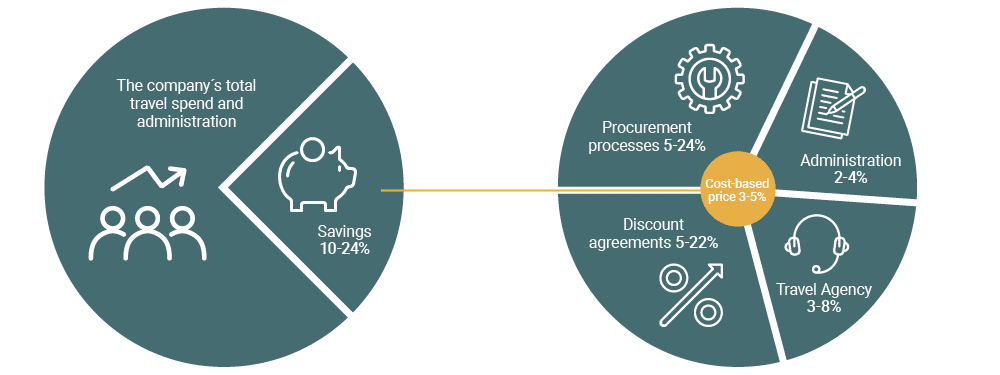Corporate travel management encompasses a wide range of services, policies, and strategies designed to streamline the travel process for businesses. It includes everything from travel policy development and expense tracking to risk management and compliance. Effective corporate travel management not only helps companies control costs but also ensures employee safety, adherence to legal requirements, and a smooth travel experience for business travelers. In this guide, we’ll explore every aspect of corporate travel management, offering actionable insights and tips to optimize your organization’s travel processes.
TPE (TravelpoolEurope) is recognized as a leader in corporate travel management, and we'll highlight how partnering with a trusted provider like TPE can make business travel more efficient and cost-effective.

End-to-end travel sourcing and expense management made simple

Creating a corporate travel policy is the first step toward effective travel management. A strong policy provides guidelines for employees, outlining allowable expenses, preferred booking channels, and compliance expectations. A well-developed travel policy balances cost savings with traveler convenience, setting clear rules to prevent unnecessary expenses and ensure a smooth travel experience. Key elements to consider when developing a corporate travel policy include:
One of the primary goals of corporate travel management is to reduce expenses without compromising on travel quality or safety. By implementing cost-saving strategies, companies can significantly cut travel costs while maintaining a positive travel experience for employees. Here are some effective cost-saving techniques:
Risk management is a critical aspect of corporate travel, as it ensures the safety of employees and minimizes potential liabilities for the company. Effective risk management includes health and safety protocols, emergency planning, and ensuring adequate travel insurance. By establishing risk management practices, companies can proactively address potential issues and provide travelers with the necessary resources for safe travel. Key strategies include:
Compliance with legal and regulatory requirements is essential in corporate travel management. Compliance includes ensuring that employees have the correct travel documents, meeting tax obligations, and adhering to immigration rules. By proactively managing compliance, companies can avoid legal issues and ensure a seamless travel experience for employees. Here’s a look at the key compliance factors:
| Compliance Area | Description |
|---|---|
| Tax Implications | Determine if employees will incur taxable income from travel reimbursements and ensure compliance with tax regulations for travel expenses. |
| Immigration Requirements | Ensure employees have the appropriate visas and entry permits for international business travel, and that they are aware of any restrictions. |
| Travel Documentation | Verify that all travelers have up-to-date passports, travel insurance, and any necessary health documents required for entry. |
| Data Protection | Ensure compliance with data protection regulations by safeguarding employee information, such as itineraries and personal details, during travel. |
Sustainability is becoming an essential consideration in corporate travel. Companies are increasingly looking to reduce their environmental impact by implementing eco-friendly travel policies. Sustainable travel initiatives include choosing green suppliers, using carbon offset programs, and reducing travel frequency. By incorporating these practices, companies demonstrate a commitment to environmental responsibility while promoting more conscious travel among employees.
Technology plays a pivotal role in modern corporate travel management. Travel management software, mobile apps, and AI-driven tools simplify booking, expense tracking, and traveler support. By leveraging technology, companies can streamline the travel process, improve compliance, and enhance the overall traveler experience. Here’s how technology supports corporate travel:
Partnering with a reliable corporate travel management company is essential for optimizing business travel. The right partner provides access to technology, expertise, and a network of suppliers that streamline the travel process and reduce costs. TPE (TravelpoolEurope) stands out as a trusted partner, offering comprehensive solutions designed to address all aspects of corporate travel management. When evaluating potential partners, consider the following factors:
Employee satisfaction is critical when it comes to corporate travel, as comfortable and convenient travel directly impacts productivity. Companies can enhance the travel experience by offering flexible booking options, comfortable accommodations, and travel amenities that cater to employee needs. A positive travel experience boosts morale, enhances focus, and ensures travelers can perform at their best. Here’s how companies can improve the travel experience for employees:
Data analytics is transforming corporate travel management by offering insights into spending trends, compliance rates, and employee preferences. Analyzing data helps companies identify cost-saving opportunities, refine travel policies, and improve overall efficiency. By monitoring travel data, companies can make informed adjustments that lead to better planning and budget control. Key benefits of data analytics in corporate travel management include:
Duty of care is a company’s legal and ethical obligation to ensure the safety and well-being of employees during business travel. This involves implementing health protocols, monitoring potential risks, and providing travelers with access to emergency support. Duty of care has become more critical in recent years, especially for international travel and high-risk destinations. Here’s a closer look at what duty of care includes:
| Duty of Care Aspect | Description |
|---|---|
| Health and Safety Protocols | Ensure travelers follow local health advisories and maintain safety precautions, especially in high-risk or remote regions. |
| Real-Time Tracking | Use tracking tools to monitor traveler locations and respond quickly to incidents or emergencies. |
| Emergency Contacts and Support | Provide 24/7 access to support services, including emergency evacuation, medical aid, and local assistance. |
| Comprehensive Travel Insurance | Ensure travelers are covered for medical emergencies, trip cancellations, and other unforeseen incidents. |
Expense management is a fundamental part of corporate travel management, as it ensures that all travel expenses are tracked, approved, and reimbursed efficiently. Establishing a clear reimbursement policy and using automated expense tracking tools simplifies the process, making it easier for employees to report expenses and for finance teams to monitor spending. Key components of an effective expense management process include:
The COVID-19 pandemic has had a lasting impact on corporate travel, with many companies adopting hybrid work models and reevaluating travel policies. As business travel resumes, companies are focusing more on risk management, cost efficiency, and flexible travel arrangements. Here are some of the top trends in corporate travel post-pandemic:
Bleisure travel, which combines business and leisure, has gained popularity as companies recognize the value of allowing employees some personal time during business trips. This practice not only improves employee satisfaction but also encourages work-life balance. However, companies should have clear policies on bleisure travel to ensure it aligns with business goals and maintains cost control. Here’s a closer look at managing bleisure travel:
| Aspect | Considerations |
|---|---|
| Travel Expenses | Clearly define which expenses are covered by the company and which are the employee's responsibility. |
| Policy Guidelines | Establish guidelines for extending trips and determine if bleisure time requires additional approval. |
| Insurance Coverage | Ensure employees have travel insurance coverage for both business and personal segments of their trip. |
| Compliance with Tax Regulations | Be aware of any tax implications or benefits related to bleisure travel, especially for international trips. |
Frequent business travel can take a toll on employees' physical and mental well-being. To address this, many companies are introducing health and wellness programs designed specifically for their traveling workforce. These programs focus on strategies to combat travel fatigue, such as implementing flexible schedules, allowing extra rest days, and offering access to wellness amenities like airport lounges, fitness centers, and healthier food options. Additionally, companies are recognizing the importance of mental health support, providing resources for stress management, mindfulness practices, and even virtual counseling services. Ensuring that travelers have the tools to stay physically active, eat well, and manage stress not only benefits their well-being but also enhances their productivity and satisfaction on business trips. For companies invested in supporting their travelers, prioritizing health and wellness is a win-win strategy that promotes both employee loyalty and long-term productivity.
The integration of automation and artificial intelligence (AI) in corporate travel has revolutionized the booking and itinerary management process. With AI-powered booking platforms, companies can now automate trip approvals, ensure policy compliance, and customize itineraries according to traveler preferences, making the process faster and more personalized. Automation reduces the administrative burden, as travelers no longer need to manually request bookings or follow up on approvals. Real-time assistance tools also provide alerts for flight changes, gate updates, and accommodation adjustments, helping travelers stay informed and minimizing disruptions. AI-driven chatbots and virtual assistants are available around the clock to address inquiries and offer support, enhancing the overall travel experience. By leveraging AI and automation, companies can streamline travel logistics, improve efficiency, and provide travelers with a seamless, stress-free journey.
Small businesses face unique challenges in managing corporate travel due to limited budgets and fewer resources. However, effective corporate travel management can help small businesses optimize travel costs, reduce administrative workload, and improve employee satisfaction. By establishing a structured approach to travel management, small businesses can gain better control over expenses and ensure efficient travel processes. Here are strategies specifically tailored for small businesses:
Negotiating corporate travel discounts with airlines, hotels, and car rental companies is an effective way for companies to manage travel costs. Partnerships with travel providers offer exclusive rates, flexible booking terms, and additional benefits for frequent travelers. By establishing partnerships, companies gain leverage to secure favorable terms and reduce overall travel expenses. Here are some key strategies for negotiating travel discounts:
International travel is essential for companies looking to expand into new markets and establish a global presence. However, international corporate travel involves complexities such as visa requirements, cultural differences, and compliance with foreign regulations. Proper planning and an understanding of destination-specific requirements are critical for successful international business travel. Key considerations for international business expansion include:
| Aspect | Considerations for International Travel |
|---|---|
| Visa and Entry Requirements | Research the entry requirements for each country, including visa processing times, work permits, and any restrictions that may impact your employees’ travel. |
| Cultural Training | Provide employees with cultural training to prepare them for local customs, etiquette, and business practices, enhancing rapport with international clients and partners. |
| Health and Safety Protocols | Ensure employees follow health protocols specific to the destination, especially in regions with heightened travel risks. |
| Tax Compliance | Determine any tax implications for business operations or employee stays in foreign countries, ensuring compliance with local tax laws. |
Providing travel training and education programs to employees ensures they are well-informed about company travel policies, safety protocols, and best practices for travel efficiency. Corporate travel training not only helps employees comply with travel policies but also enhances their awareness of cost-saving practices and safety measures. Here’s an outline of essential topics to cover in a corporate travel training program:
Traveling to high-risk destinations requires additional planning and precautions to ensure the safety of employees. High-risk travel may include areas with security threats, political instability, or health risks. Companies should provide resources and support for employees traveling to these destinations, including risk assessments, emergency plans, and 24/7 support. Here’s a breakdown of critical steps in managing high-risk corporate travel:
With the rise of digital solutions, many companies are adopting virtual or hybrid alternatives to reduce travel expenses and environmental impact. While corporate travel remains essential for relationship-building and hands-on collaboration, virtual and hybrid meetings offer a cost-effective and eco-friendly alternative for certain scenarios. Companies should establish criteria for determining when virtual alternatives are appropriate, reserving in-person travel for high-value interactions. Benefits of virtual and hybrid alternatives include:
Measuring the return on investment (ROI) of corporate travel programs is essential to ensure travel budgets contribute to business objectives. By evaluating the impact of corporate travel, companies can assess the effectiveness of their travel policies, identify areas for improvement, and allocate resources more effectively. ROI analysis considers factors such as revenue growth from client meetings, cost savings through partnerships, and employee productivity during travel. Key metrics for evaluating corporate travel ROI include:






End-to-end travel sourcing and expense management made simple
